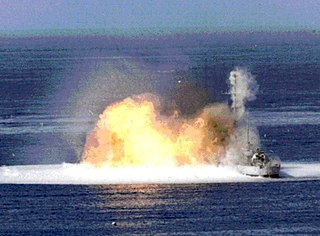
The Qatar Armed Forces are the military forces of the State of Qatar. Since 2015, Qatar has implemented mandatory military conscription with an average of 2,000 graduates per year. As of 2010, Qatar's defence expenditures added up to a total of $1.913 billion, about 1.5% of the national GDP, according to the SIPRI. Qatar has recently signed defence pacts with the United States in 2002 & 2013, with the United Kingdom in 2020, and with France in 1994.

The Saudi Arabian Armed Forces (SAAF), also known as the Royal Saudi Armed Forces, is part of the military forces of the Kingdom of Saudi Arabia. It consists of the Royal Saudi Army, the Royal Saudi Navy, the Royal Saudi Air Force, the Royal Saudi Air Defense, and the Royal Saudi Strategic Missile Force. The King of Saudi Arabia is the commander-in-chief of all the military forces and forms military policy with the Ministry of Defense and the Ministry of Interior. The five Armed Forces are among eight military forces of Saudi Arabia, with the others including the Royal Saudi National Guard, the Royal Saudi Guard Regiment and the Royal Saudi Border Guards.

A thermobaric weapon, also called an aerosol bomb, or a vacuum bomb, is a type of explosive munition that works by dispersing an aerosol cloud of gas, liquid or powdered explosive. The fuel is usually a single compound, rather than a mixture of multiple substances. Many types of thermobaric weapons can be fitted to hand-held launchers, and can also be launched from airplanes.

The Israel Defense Forces, alternatively referred to by the Hebrew-language acronym Tzahal (צה״ל), is the national military of the State of Israel. It consists of three service branches: the Israeli Ground Forces, the Israeli Air Force, and the Israeli Navy. It is the sole military wing of the Israeli security apparatus. The IDF is headed by the Chief of the General Staff, who is subordinate to the Israeli Defense Minister.

The arms industry, also known as the defense industry, military industry, or the arms trade, is a global industry which manufactures and sells weapons and other military technology to a variety of customers, including the armed forces of states and civilian individuals and organizations. Products of the arms industry include weapons, munitions, weapons platforms, communications systems, and other electronics, and related equipment. The arms industry also provides defense-related services, such as logistical and operational support. As a matter of policy, many governments of industrialized countries maintain or support a network of organizations, facilities, and resources to produce weapons and equipment for their military forces. This is often referred to as a defense industrial base. Entities involved in arms production for military purposes vary widely, and include private sector commercial firms, state-owned enterprises and public sector organizations, and scientific and academic institutions. Such entities perform a wide variety of functions, including research and development, engineering, production, and servicing of military material, equipment, and facilities. The weapons they produce are often made, maintained, and stored in arsenals.

The Fajr-3 is an Iranian heavy 240 mm intermediate-range multiple-launch artillery rocket (MLRS). The Fajr-3 is a license-built copy, with slight modifications, of a North Korean MLRS called the M-1985. The Fajr-3 was introduced in the 1990s and has since been exported to Syria, Hamas and Hezbollah.
The Directorate of Ordnance is an authority under the Department of Defence Production (DDP) of Ministry of Defence (MoD), Government of India. Its primary work is to management, give instructions and make coordination of government Ordance production public companies. It is the main regulatory body of Indian Ordnance and its administration civil service, Indian Ordnance Factories Service (IOFS). The DOO(C&S) earlier known as Ordnance Factory Board (OFB), consisting of the Indian Ordnance Factories. In 2021, Government having corporatise the functions of the 41 Indian Ordnance Factories into 7 Defence Public Sector Undertakings (DPSUs), the Government is merging them again in 2024, as the output of one factory serves as the input of the other.

Military relations between Israel and the United States have been extremely close, reflecting shared security interests in the Middle East. Israel is designated as a major non-NATO ally by the U.S. government. A major purchaser and user of U.S. military equipment, Israel is also involved in the joint development of military technology and it regularly engages in joint military exercises with United States and other forces. The relationship has deepened gradually over time, though, as Alan Dowty puts it, it was "not a simple linear process of growing cooperation, but rather a series of tendentious bargaining situations with different strategic and political components in each."
The arms industry of Russia, also known as the defense industry of Russia is a strategically important sector and a large employer in the Russian Federation. It employs approximately 3.5 million people nationwide and accounts for 20% of all manufacturing jobs in Russia. Total defense spending in Russia reached 7.5% of GDP in 2023.

Iron Dome is an Israeli mobile all-weather air defense system, developed by Rafael Advanced Defense Systems and Israel Aerospace Industries. The system is designed to intercept and destroy short-range rockets and artillery shells fired from distances of 4 to 70 kilometres (2–43 mi) away and whose trajectory would take them to an Israeli populated area. From 2011 to 2021, the United States contributed a total of US$1.6 billion to the Iron Dome defense system, with another US$1 billion approved by the US Congress in 2022.
The Centre d'études et de recherches scientifiques (CERS), was a Syrian government agency that has the goal of advancing and coordinating scientific and military research activities in the country. It works on research and development for the economic and social development of Syria, especially the computerization of government agencies. It is considered to have better technical capacity and equipment than the Syrian universities. Jane's Information Group Intelligence Services and other analysts believe it is responsible for research and development of nuclear, biological, chemical and missile technology and weapons, including ballistic missiles, as well as advanced conventional arms.
The defense industry of Israel is a strategically important sector and a large employer, as well as a major supplier of the Israel Defense Forces. The country is a large exporter of military equipment, accounting for 2.1% of the world total in 2024. Three Israeli companies were listed on the 2022 Stockholm International Peace Research Institute index of the world's top 100 arms-producing and military service companies: Elbit Systems, Israel Aerospace Industries and RAFAEL. It is also a major player in the global arms market with a 2.3% share of the global exports of major arms as of 2023. Total arms transfer agreements topped $12.9 billion between 2004 and 2011. There are over 150 active defense companies based in the country with combined revenues of more than $3.5 billion annually. Israeli defense equipment exports reached $7 billion in 2012, making it a 20 percent increase from the amount of defense-related exports in 2011. With the Russian invasion of Ukraine, arms exports reached $12.5 billion in 2022. Much of the exports are sold to the United States and Europe. Other major regions that purchase Israeli defense equipment include Southeast Asia and Latin America. India is also major country for Israeli arms exports and has remained Israel's largest arms market in the world.

The defence industrial sector of India is strategically important in India. India has one of the world's largest military forces with a strength of over 1.44 million active personnel. The country has the world's largest volunteer military of over 5.1 million personnel. The total budget sanctioned for the Indian military for the financial year 2021 is ₹4.78 lakh crore. It has the third largest annual defence budget behind USA and China. It is the second largest defence importer behind Saudi Arabia making up 9.2% of global arms imports. India has a domestic defence industry of which 60% is government owned. The public sector includes NTRO, CSIR, PRL, DRDO and its 50 labs, 4 defence shipyards, 12 defence public sector undertakings (PSUs). India has a new defence procurement, acquisition and manufacturing policy to reduce imports and enhance domestic manufacturing.

EDGE Group is an Emirati advanced technology and defence conglomerate comprising 25 companies involved in military and civilian products, and technologies.

The defense industry of Ukraine is a strategically important sector and a large employer in Ukraine. Before the start of the War in Donbas, it was mostly used as part of Ukraine’s arms export market. However, it has leaned significantly towards increased Ukrainian military procurement since then.

Israel has been accused of committing genocide in the Israel–Hamas war, and the United States has been accused of complicity in the Gaza genocide. The complicity accusation has been made in court, by federal staffers, human rights organizations and academic figures around the world. The US has also been accused of enabling the Gaza Strip famine.
Since 7 October 2023, several countries such as Italy, Japan, Spain, Canada, the Netherlands and Belgium have ceased the sale of weapons to Israel. Key U.S. allies such as Britain and France are debating it. However the United States and Germany as the major suppliers of Israel's arms imports keep supplying lethal weapons in spite of growing criticism of the mounting civilian casualties.












